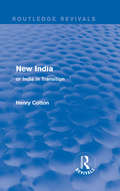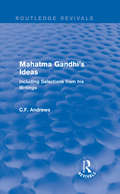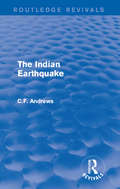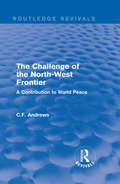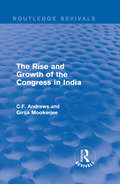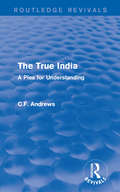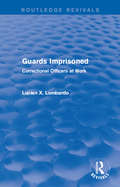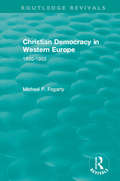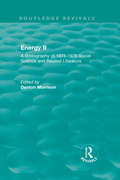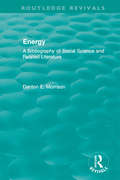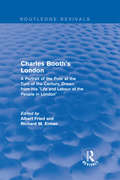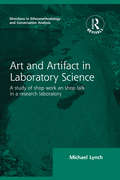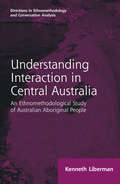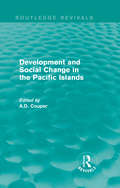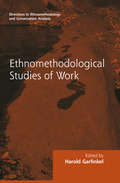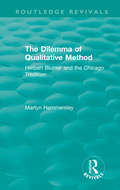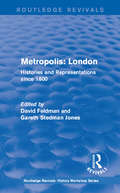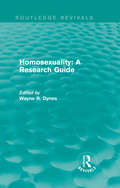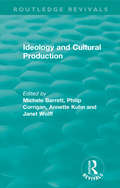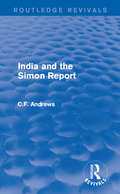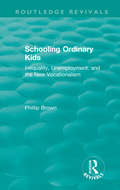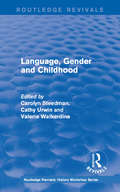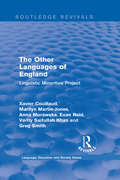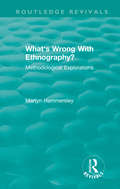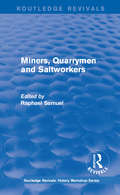- Table View
- List View
Routledge Revivals (1909): or India in Transition
by Henry CottonFirst published in 1909, the purpose of this book was to draw attention to the political, social and religious changes that were taking place in India and detail how this should inform British colonial policy. The author argues that the political situation demanded decisive action as several factors had caused increasing difficulties in administration: waning enthusiasm on the part of English officials, greater tension between the governors and the governed — often caused by colonial arrogance which had been brought into sharper relief by spread of education and the growth of patriotic feeling. He also argues that the crux of India’s economic difficulties was the poverty of its people and asserts that the solution to both problems was the ‘sympathetic and systematic encouragement of her legitimate aspirations and patriotic tendencies’. In regard to the social and religious changes, the author observes that the changes are not less considerable and advises that the government should, as far as was possible, maintain the existing basis by a policy of ‘wise conservation’. This book will be of interest to students of Indian history and colonialism.
Routledge Revivals (1929): Including Selections from his Writings
by C.F. AndrewsFirst published in 1929, this book was intended to explain, "with documentary evidence", the main principles and ideas for which Gandhi had stood over the course of his career up until that point. The author draws upon his long and intimate personal relationship with Gandhi to give an authoritative and individual account of a man whose politics and philosophy has invited continuing analysis — extended with illustrative selections from his speeches and writings. The context in which Gandhi’s ideas were formed and developed provides the focus for this book with the first part examining the religious environment and the second the historical setting.
Routledge Revivals (1935): A Plea for Understanding
by C.F. AndrewsFirst published in 1935, this book provides a comprehensive overview of the 1934 Nepal-Bihar earthquake, giving a background to the earthquake zone, describing the event itself and surveying the ensuing devastation. The author also looks at the government’s actions and the response of India’s other states as well as the religious and social dimension to the reaction — exemplified by Mahatma Gandhi. The book examines how the earthquake was compounded by a severe flood that occurred shortly before, how preparations for the monsoon season were made in an attempt to limit further destruction and the subsequent recommendations for more earthquake resistant urban planning.
Routledge Revivals (1937): A Contribution to World Peace
by C.F. AndrewsFirst published in 1937, this book grew out of the author’s belief that there needed to be a ‘drastic revision’ of British policy on the North-West Frontier of India (now Khyber Pakhtunkhwa in Pakistan) in order to achieve a lasting peace. The author examined the causes of continued hostility and non-military methods that might prevent further outbreaks of war — reducing or removing British troops and leaving the settlement of disputes to Indians. He traces the changing attitudes of Indians towards British rule and the increasing popularity of calls for independence while also detailing the wider Indian context. This book will be of interest to students of Indian and colonial history.
Routledge Revivals (1938): The Rise And Growth Of The Congress In India (1938)
by C.F. Andrews Girija MookerjeeFirst published in 1938, this book aims to provide a history of the rise and growth of the Indian National Congress for the general reader, covering the period from its foundation in 1885 until the beginning of the non-co-operation movement in 1920. It was intended to extend the official history of the Congress by Pattabhi Sitarammayya by making it more accessible to western readers while also giving more space to the religious and social forces in Indian history during the nineteenth century which led to the birth of the congress. It also looks at forerunner organisations like The British Indian Association before examining the history and evolution of the congress in several phases.
Routledge Revivals (1939): A Plea for Understanding
by C.F. AndrewsFirst published in 1939, this book sets out to refute some of the ‘unjust charges laid at India’s door’ and correct the ‘false impressions’ that prevailed at the time. The author argues that the distorted view of the social conditions in India in the contemporary press and literature were detrimental to the relationships between East and West. Attempting to give a picture of the true state of affairs, they show that Hinduism was reforming from within and that it was unjust to still equate it with earlier periods. The Depressed classes, women’s rights, child marriage, Caste and Kalighat are all examined in detail. The book will be interest to students of colonial India and social history.
Routledge Revivals (1989): Correctional Officers at Work
by Lucien X. LombardoFirst published in 1989, Guards Imprisoned provides an in-depth look into the work and working life of prison guards as they perceive and experience it. The author, who was a teacher at Auburn Prison, New York, discovered that little was known about the guard’s perceptions of his "place" in the prison community and set out to explore the dynamics of this key correctional occupation from the perspective of those who do it. The raw data was provided by over 160 hours of interviews with guards and is presented in the order of a "natural history" — from their prerecruitment images of prison to the search for satisfaction as experienced guards. The book also includes a follow-up with the officers who were originally interviewed in 1976, assessing patterns of change and stability in their attitudes and behaviors. The Auburn Correctional Facility (renamed from Auburn Prison in 1970) was the second state prison in New York, the site of the first execution by electric chair in 1890, and the namesake of the famed "Auburn System" replicated across the country, in which people worked in groups during the day, were housed in solitary confinement at night, and lived in total silence. The facility is celebrating the 200th anniversary of its groundbreaking in 2016.
Routledge Revivals: 1820-1953 (Routledge Revivals)
by Michael P. FogartyFirst published in 1957, this book is a detailed analysis on Christian Democracy, a movement backed by Protestants as well as Catholics, which has become one of the great social forces of Western Europe. It is strong in eight countries. The first half of Fogarty’s book sets out what the many Christian-Democratic movements stand for. The second part of the book shows how these movements began, how they have grown, changed, and consolidated, and how they developed into the mid-20th century. This is a broad and useful survey which delves the history, nature and significance of the Christian Democratic movements in Europe. In Fogarty’s analysis, Christian Democracy may indeed bring about a renewed unity of the Christian tradition in Western society.
Routledge Revivals: A Bibliography of 1975-1976 Social Science and Related Literature (Routledge Revivals)
by Denton MorrisonOriginally published in 1977, Energy II provides a comprehensive and updated bibliography of energy in the context of the social sciences. Following on from the first bibliography published in 1975, this book offers a fully updated bibliography, and argues that energy problems are best seen in the context of social phenomena, such as social attitudes, social behaviours, social institutions and structures and populations. The book provides a unique list of references that examine energy problems outside of the context of social factors.
Routledge Revivals: A Bibliography of Social Science and Related Literature (Routledge Revivals)
by Denton E. MorrisonOriginally published in 1975, Energy provides a comprehensive bibliography of energy in the context of the social sciences. The book argues that energy problems are best seen in the context of social phenomena, such as social attitudes, social behaviours, social institutions and structures and populations. The authors argue that to examine energy problems outside of the context of social factors is to lack a full and detailed examination of the subject. The bibliography provides a comprehensive collection of sources from a range of areas in the social sciences on the subject of energy.
Routledge Revivals: A Portrait of the Poor at the Turn of the Century, Drawn from His "Life and Labour of the People in London" (Routledge Revivals)
by Albert Fried Richard M. ElmanFirst published in 1969, this book presents a one-volume anthology of Charles Booth’s Life and Labour of the People in London, the classic early study of the poor in the urban environment. The original text consists of a vast compendium of descriptions of families, homes, streets, conditions of work, cultural and religious practices, much of it illustrated with charts, maps and statistics — giving the public an idea of the dimensions and meaning of poverty. The editors have selected the extracts in this book for their vividness, readability and intrinsic interest, and their introduction conveys the context of 1880s London — relating Booth’s investigations to contemporary concerns.
Routledge Revivals: A study of shop work and shop talk in a research laboratory (Directions in Ethnomethodology and Conversation Analysis)
by Michael LynchFirst published in 1985, this book provides a descriptive study of social activities in a neurosciences laboratory. Based on fieldwork conducted by the author in the laboratory during 1975 and 1976, and taking an ethnomethodological approach, it focuses on the phenomenon of the social accomplishment of natural scientific order. Through the examination of shop work and shop talk in this environment, it identifies an analyzable social basis in the local production of accounts of natural objects in laboratory research. This work will be of interest to students and scholars of ethnomethodology and sociology.
Routledge Revivals: An Ethnomethodological Study of Australian Aboriginal People (Directions in Ethnomethodology and Conversation Analysis)
by Kenneth LibermanFirst published in 1985, this book gives an intimate account of the cultural-political conflict between Australian Aboriginal people and Anglo-Australians, presenting the Australian social world from the perspective of the Aboriginal person. Adopting a rigorous ethnomethodological analysis and the techniques of ethnolinguistics, Liberman looks at the interactional detail of the everyday life of traditionally oriented Australian Aboriginals. He uses tape transcripts of actual interaction to identify chief characteristics of Aboriginal social life. Liberman goes on to show how differences in systems of interaction have influenced relations between Australian Aboriginals and Anglo-Australians. With its account of the politics of cultural conflict in a multi-cultural environment, this book is an apt extension of ethnomethodological issues to political concerns. It also exposes Aboriginal perceptions of Anglo-Australian/Aboriginal interaction to a degree not previously achieved in any sociological or anthropological study. As such, this book will be a valuable case study to students of social anthropology, race relations, intercultural communication and sociolinguistics.
Routledge Revivals: Development and Social Change in the Pacific Islands (1989)
by A. D. CouperFirst published in 1989. The Pacific Islands are amongst the poorest countries of the developing world. The special problems of their small size, immense distance from major centres and, for many, very poor agricultural possibilities make development extremely difficult. However, recent new advances in maritime technology in a wide range of different areas present substantial new opportunities. This book surveys the new developments — including extended maritime boundaries; giant clam farming; increased exploitation of ocean minerals and new fisheries techniques — and demonstrates the potential for far-reaching economic and social development.
Routledge Revivals: Ethnomethodological Studies of Work (Directions in Ethnomethodology and Conversation Analysis)
by Harold GarfinkelFirst published in 1986, this collection of essays brings together ethnomethodological studies from key academics of the discipline, including the renowned scholar Harold Garfinkel who established and developed the field. In addition to four case studies, the volume begins and ends with two essays which discuss some of the theory employed by ethnomethodologists. The essays in this collection look at a range of areas, from truck wheel accidents and their regulation, to martial arts and alchemy and provide concise and insightful examples of the ways in which ethnomethodology can be applied to a number of settings and subjects. This work will be of interest to those studying ethnomethodology and sociology.
Routledge Revivals: Herbert Blumer and the Chicago Tradition (Routledge Revivals)
by Martyn HammersleyOriginally published in 1989, The Dilemma of Qualitative Method is a stimulating guide to the discussion of qualitative versus quantitative approaches to social research, originated in nineteenth-century debates about the relationship between the methods of history and natural science. One of the key theorists in this area was Chicago sociologist Herbert Blumer. The book analyses the historical context of the dispute and provides a detailed account and systematic analysis Blumer’s methodological writings including his doctoral thesis. The strategies for qualitative research advocated by Blumer within the Chicago tradition are reviewed and assessed.
Routledge Revivals: Histories and Representations since 1800 (Routledge Revivals: History Workshop Series)
by David Feldman Gareth Stedman JonesFirst published in 1989, this book seeks to demonstrate the social and political images of late-twentieth century London — the post-big-bang city, docklands, trade union defeats, a mounting north-south divide — do not mark as decisive break with the past as they may appear to. It argues that the most striking thing about London’s history since 1800 is the continuities and recurrences which punctuate it. The essays collected in this book focus on these themes and address important questions about class, nationality, sexual difference, and radical politics. They combine the established strengths of social history with more innovative approaches such as the history of representations.
Routledge Revivals: Homosexuality: A Research Guide (Routledge Revivals)
by Wayne R. DynesFirst published in 1987, this book encompasses a broad range interdisciplinary research into homosexuality — displaying a full spectrum of points of view — and, given that the major traditions of modern homosexual research began in Europe, is not restricted to works in English.. In general topics that are densely covered in the literature are presented in this guide selectively, with some less studied topics, such as Economics and Music, fleshed out with signposts to more comprehensive research. It seeks to not only mirror existing publications, but also to stimulate new work by pinpointing neglected themes and methods. This book will be of interest to students of sociology.
Routledge Revivals: Ideology And Cultural Production (1979) (Routledge Revivals)
by Janet Wolff Annette Kuhn Michèle Barrett Philip CorriganOriginally published in 1979, Ideology and Cultural Production examines the contribution to the debate surrounding ‘culture’, ‘ideology’, and ‘representation’, in this collection of essays. Originally presented as papers at the 1978 British Sociological Conference on the theme of culture, the collection is tied together under the argument for a definition, which emphasizes the material and ideological conditions of cultural production. The volume discusses key issues, such as the break with ‘super-structural theory’, the question of economism, and the argument between culturalism and structuralism, as well as the central debates of determinism and autonomy.
Routledge Revivals: India and the Simon Report (1930)
by C.F. AndrewsFirst published in 1930, this book sought to explain to western readers the vital necessity of approaching the ‘Indian problem’ from the emerging national standpoint in India, and of appreciating its ideals. The author relates this necessity directly to the task undertaken by the Simon Commission in 1928 to make a survey of India and the resultant suggestions for constitutional changes in their report in early 1930. This work represents an attempt to bridge the gulf between India and Britain, one which appeared to be widening at the time of the report. This book will be of interest to students of colonialism and colonial India, especially as a prelude to its independence in 1947.
Routledge Revivals: Inequality, Unemployment, and the New Vocationalism (Routledge Revivals)
by Phillip BrownOriginally published 1987 Schooling Ordinary Kids looks at the ‘invisible majority’ of ordinary working-class pupils. The book explains why these pupils are now at the centre of a major educational crisis surrounding the soaring rates of youth unemployment. The book is a timely examination of educational inequalities, unemployment, and the new vocationalism. Drawing extensively the study of schools in the urban centre of South Wales the book highlights the need for an alternative politics of education, if we were to meet the educational challenge of the late-twentieth century. The new vocationalism is revealed here as a policy for inequality both politically and in the classroom.
Routledge Revivals: Language, Gender and Childhood (Routledge Revivals: History Workshop Series)
by Carolyn Steedman, Cathy Urwin and Valerie WalkerdineFirst published in 1985, this book brings together recent work on women and children from the nineteenth-century to the present. The contributors explore in different ways, and from different points of view, the way in which issues of language have been — and are still — central to the history of women and their relation to domestic and educational practices. A crucial issue is the contrast between what it spoken about girls and women, and what girls and women can speak about. The contributors relate this theme specifically to women’s position as mothers and the education of girls and women.
Routledge Revivals: Linguistic Minorities Project (Routledge Revivals: Language, Education and Society Series #2)
by Greg Smith Xavier Couillaud Marilyn Martin-Jones Anna Morawska Euan Reid Verity Saifullah KhanThe ‘other’ languages of England — those which originate in South and East Asia, and Southern and Eastern Europe — are now important parts of everyday life in urban England. First published in 1985, this book gives detailed information about which languages are in widespread use among children and adults, patterns of language use in different social contexts, the teaching of these community languages inside and outside of mainstream schools, and the educational implications of this linguistic diversity for all children in England. They authors argue that this continued and widespread bilingualism is a valuable potential resource for both the speakers and society as a whole.
Routledge Revivals: Methodological Explorations (Routledge Revivals)
by Martyn HammersleyOriginally published 1992 What's Wrong With Ethnography? provides a fresh look at the rationale for and distinctiveness of ethnographic research in sociology, education and related fields. Relativism, critical theory, the uniqueness of the case study and the distinction between qualitative and quantitative research are all examined and found wanting as a basis for informed ethnography. The policy and political implications of ethnography are a particular focus of attention. The author compels the reader to re-examine some basic methodological assumptions in an exciting way.
Routledge Revivals: Miners, Quarrymen and Saltworkers (Routledge Revivals: History Workshop Series)
by Raphael SamuelIndustrial discipline in mining, quarrying, brickmaking and other classes of mineral work was very different to that in nineteenth-century factories and mills. First published in 1977, this book deals with mineral workers of every class and discusses the peculiarities and common features of their work. It offers three detailed local studies: pit life in County Durham, slate quarrying in North Wales, and saltworkers in Cheshire alongside an introductory section on mineral workers in general. The author is concerned with the family and community setting; the social relationships at the point of production itself; job control and trade unionism; and with material culture, wages and earnings.
